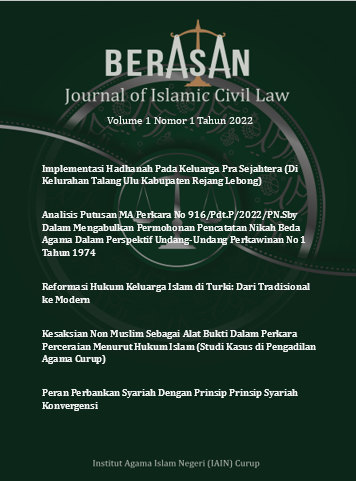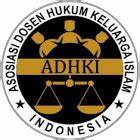Analisis Putusan MA Perkara No 916/Pdt.P/2022/PN.Sby Dalam Mengabulkan Permohonan Pencatatan Nikah Beda Agama Dalam Perspektif Undang-Undang Perkawinan No 1 Tahun 1974
DOI:
https://doi.org/10.29240/berasan.v1i1.4736Keywords:
Nikah, Beda Agama, Undang-undangAbstract
Abstract: Interfaith Marriage in the Perspective of Marriage Law No. 1 of 1974 (Review of Analysis of Article 2 of Law No. 1 of 1974 concerning Marriage). Indonesia is a country with a multi-religious society. The various religions and beliefs held by the Indonesian people open up the potential for interfaith marriages. Interfaith marriages often cause polemics in society, this is because in Indonesia interfaith marriage is something that is considered uncommon and contrary to religious beliefs held by the majority of Indonesian people. In Indonesia, the rules related to marriage are contained in Law No. 1 of 1974 concerning Marriage and the Compilation of Islamic Law. Article 2 of the Marriage Law No. 1 of 1974 states that "a marriage is said to be valid if it is carried out according to the laws of each religion and belief". Problems arise when marriages are carried out by different religions and different beliefs, and the article does not mention interfaith marriages. The purpose of writing this scientific article is to examine and analyze the meaning related to these rules and other rules related to marriage in the Indonesian legal system, in order to determine and confirm the position of interfaith marriages according to Indonesian laws and regulations. This research is a normative research using the approach of legislation in Indonesia. Based on the analysis of the legal material obtained, interfaith marriage according to the marriage law in Indonesia is not allowed.
Downloads
References
Ahmad Rifai, “Sejarah Undang-Undang Perkawinan Atas Pendapat Hingga Pertentangan Dari Masyarakat Dan Dewan Perwakilan Rakyat Tahun 1973-1974,†Indonesian History, (2015),
Cora Vreede-de Stuers, Sejarah Perempuan Indonesia, (Jakarta: Bambu, 2008)
Dudung Abdul Rahman, Metodologi Penelitian sejarah, ( Yogyakarta: Ar-Ruzz Media Group 2007)
Erma Kartika Timur, Abdul Rahmat Budianto, Rahmi Sulistiyarini, Penetapan Pengadilan Dalam Mengabulkan dan Tidak Menerima Permohonan Perkawinan Beda Agama (Studi terhadap Penetapan No 73/Pdt.P/2007/PN.Ska dan nomor 375.Pdt.P/2013/PN.Ska).
Hikmah Diniah, Gerwani Bukan PKI: Sebuah Gerakan Feminisme Terbesar di Indonesia,
(Yogyakarta:Carasvati Book, 2007), h. 163
https://www.cnnindonesia.com/nasional/20220318182241-20-773354/deretan-pernikahan-beda-agama-warga-semarang-hingga-stafsus-jokowi diakses pada tanggal 3 Juni 2022 pukul 10:30
Khoiruddin Nasution, Status Wanit di Asia Tenggara: Studi Terhadap Perundang-Undangan
Perkawinan Muslim Kontemporer di Indonesia dan Malaysia, (Jakarta:INIS, 2002).
Kustini, Menelusuri Makna Dibalik Fenomena Pernikahan Dini, (Jakarta:Kementerian Agama RI Badan Litbang dan Puslitbang Kehidupan Keagamaan, 2013)
Kementerian Agama RI, Alquran dan Terjemahan,
Khiyaroh, Al-Qadha: Jurnal Hukum Islam dan Perundang-Undangan, Volume 7 No 1, Juni 2020,(h.1-15)
Mendra_Siswanto-https://media.neliti.com/media/publications/398206-fatwa-fatwa-hukum-keluarga-majelis-ulama-63a7454b.pdf
M. Anshary, Hukum Perkawinan di Indonesia,( Yogyakarta: Pustaka Pelajar, 2010)
Muhammad Ali al-Shabuni, Rawai’ul Bayan Tafsir Ayat Ahkami Min Alqur’an, (Dar al-Kutub al-Islamiyah, 199)
Nur Aisyah, Kajian Hukum Terhadap Pernikahan Beda Agama Menurut Undang-Undang Perkawinan dan Hukum Islam. jurnal Hukum Samudra Keadilan. Vol 10 No 2 Juli-Desember 2015
Perkawinan Campuran, (Problematika dan solusinya) Drs. H. Nawawi. N, M.Pd.I Widyaiswara Madya Balai Diklat Keagamaan Palembang
Pasal 66 Undang-Undang No 1 Tahun 1974 tentang Perkawinan
Rumadi, Wiwit Rizki fathurahman, Perempuan dalam Relasi Agama dan Negara, (Jakarta:Kompas Peremuan, 2010)
Paulus Effendie Letulung, Peranan yurisprudensi Sebagai Sumber Hukum, (Badan Pembinaan Hukum Nasional 1997/1998)
Surat Edaran Mahkamah Agung No.231/PAN/HK.05/1/2019 tanggal 30 Januari 2019.
Undang-Undang No 1 Tahun 1974 Tentang Perkawinan
Yuni Setia Rahayu, “Konsistensi Perwari Dalam Membela Hak Peremuan: Tinjauan terhadap kerja perwari tahun 1945-1965â€, Tesis Universitas Indonesia ( 2003),
Downloads
Published
Issue
Section
Citation Check
License
Authors who publish with Berasan: Journal of Islamic Civil Law agree to the following terms:
- Authors retain copyright and grant the journal right of first publication with the work simultaneously licensed under a Creative Commons Attribution-NonCommercial-ShareAlike 4.0 International License (CC BY-NC-SA 4.0) that allows others to share the work with an acknowledgment of the work's authorship and initial publication in this journal.
- Authors are able to enter into separate, additional contractual arrangements for the non-exclusive distribution of the journal's published version of the work (e.g., post it to an institutional repository or publish it in a book), with an acknowledgment of its initial publication in this journal.
- Authors are permitted and encouraged to post their work online (e.g., in institutional repositories or on their website) prior to and during the submission process, as it can lead to productive exchanges, as well as earlier and greater citation of published work (See The Effect of Open Access).









